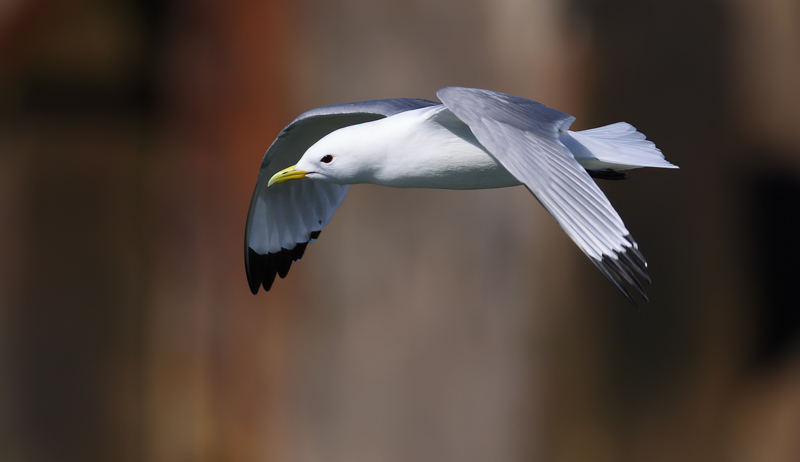The RSPB is calling on the UK Government to act now to help safeguard the future of threatened seabirds following record-breaking marine temperatures off the UK and Irish coasts.
In a letter to Defra minister Lord Benyon, the UK’s largest nature conservation charity has warned that recent sea temperature rises of 4-5°C above average for this time of year could pile added pressure onto already fragile populations, like our globally important seabirds.
Seabirds are a key indicator of the health of our seas and coastal environment, the canaries in the coalmine. Shockingly, the UK list of Birds of Conservation Concern has 24 of the 25 UK breeding seabird species at risk of local or global extinction and across the UK, the number of breeding seabirds has fallen by almost a quarter in the last 30 years. Amazing birds such as Puffins, Kittiwakes and Fulmars will continue to decline without action to tackle key threats and repair already fragile marine ecosystems.

Kittiwake, copyright Glyn Sellors, from the surfbirds galleries
Climate change is a major threat to seabirds, as well as humans. Rising sea temperatures will have radical impacts on marine ecosystems and everyone who depends on our seas for their well-being and livelihoods. Yet as the heatwave pushed up sea temperatures, the Committee on Climate Change highlighted ‘worryingly slow’ progress to tackle the climate emergency here in the UK.
Alongside efforts to tackle climate change and decarbonise all sectors, the RSPB wants to see urgent action to address the cocktail of threats facing the UK’s globally important seabird populations. The charity is calling on the UK Government to publish and implement the long-awaited English Seabird Conservation and Recovery Plan and the UK Marine Strategy Programme of Measures to help restore seabirds to its indicator of Good Environmental Status, which it is currently moving away from.
Specific actions to protect and restore the UK’s seas are vital and long overdue. Implementing a ban on industrial sandeel fishing in the North Sea to ensure more food is available for seabirds, a national programme to restore and improve the biosecurity of seabird islands, and action to tackle accidental deaths of marine life in fishing gear would all help improve the fortunes of seabirds.
Jeff Knott, director of policy and advocacy at the RSPB, said: “These record temperatures aren’t an early warning sign. They are yet another example of climate change on our doorstep, disrupting ecosystems in sudden and unexpected ways. If we are to give our seabirds a fighting chance we must act quickly to build resilience in their populations and improve the health of our seas.
“Restoring our special seabird islands, cutting accidental deaths caused by longline and gillnet fishing and pushing ahead with bans on industrial sandeel fishing across the UK are all measures that can and should be taken now. Bird flu has had a devastating impact on our seabirds over the last two years but they have also faced decades of increasing human-induced pressures. It’s time to throw them a lifeline.”
Met Office figures published yesterday confirmed June as the hottest on record for the UK. The consequences of a warming planet include increased marine heatwaves, which already have a record of having catastrophic impacts on marine life. Between 2015 and 2016, warming of just 1-2°C off the west coast of the USA (caused by a heatwave known as ‘the blob’) left seabirds starving, resulting in the death of one million common Guillemots. Warming seas and increasingly frequent extreme weather events impact the whole marine food chain – from tiny creatures like plankton upwards, with knock-on consequences for the species that depend on them for food.
The current marine heatwave follows last year’s record-breaking temperatures in waters off the south and east coast of England. It adds to the growing body of evidence underlining the effect of human activity on our seas from climate change, badly planned development and unsustainable fishing.
The RSPB is also seeing an increasing number of unusual signs from coastal breeding sites across the UK which has raised concerns.
- Kittiwakes, a key species on the frontline of the climate and nature emergency, are now threatened with global extinction. At Bempton Cliffs, the heart of the UK’s largest mainland seabird colony, the Kittiwake population is flatlining with the number of chicks successfully fledged down to an average of around 0.6 chicks per nest over the last decade.
- Large numbers of emaciated, dead and dying auks, particularly Guillemots, were reported along North Sea coasts during the autumns of 2021 and 2022. Although so-called ‘seabird wrecks’ are not uncommon, they typically happen after poor winter weather. The cause of these unusually timed wrecks remains unknown.
- Seabirds have been reported breeding earlier than usual at some key sites this year and later than usual at others. The full picture across the UK won’t be known until monitoring for the 2023 breeding season is complete.
Jeff added: “While anecdotal reports can only ever act as a guide, the volume and impact of issues coming to light are cause for serious concern. Scientific monitoring to help us understand what we are seeing continues, but in the meantime, we need the UK Government to take notice of the warning signs and act now.
“We hope to raise all these issues in person with the Defra Secretary of State and work together to address the impact that climate change and other pressures are having on our environment, nature, people and their livelihoods.”